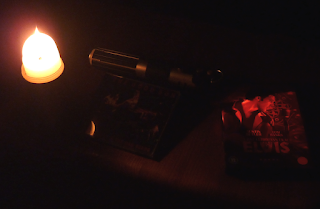For all that one of my aims, in planning Chronicles of a Dead End, was to strip Escapade of what I have come to regard as a misguided concept, I feel that it's turning out something of a concept album anyway. It's sort of emerged organically, as while I chose the new running order mainly with a mind to what works musically, this has (broadly speaking) resulted in a most interesting arrangement where the main album's 7 tracks go from least to most personal. So it's kind of a journey inwards through 7 concentric layers of the mind, or something like that.
In particular, even well before I'd decided on what "Escapade" (the song) should be about, it seemed to me that it and "Look and See" formed a natural pair to serve as the album's conclusion. Therefore, it feels right to work on both side by side, even if this is actually the result of a lull in my recording schedule for "Look and See".
The difficulty in choosing a coherent lyrical topic for this one lies in the fact that its three main musical "components" each themselves have vastly different inspiration behind them. One of them, however, is certainly best ignored: the title of "March for the Age" says it all. If you're going to write a piece of music that bemoans the passing of some nebulously defined cultural "golden age", I think it has to be musically worthy of the best of the age in question to work. Put another way, a piece with that title has the biggest possible shoes to fill! In any case, I've (belatedly) learned to be leery of any narrative that asserts that there was ever a "golden age" of any kind. And that's all I'm going to say about that.
The second(-ish) component, "My Next/Last Escape", is extremely cryptic but appears to be coming from a similar place to the "past" part of "Look and See", where I felt trapped and unable to move on from the situation described there. I kept a surprising amount of the original first verse, but discarded the rest without a second thought, in favour of some commentary (from a hopeful perspective) on the relentless bullying that largely drove me into such a state of desperation.
The third component, "After the Party", was inspired by a song called "Last Day", one of the songs written and performed at the Rock Shop department of the 2006 Dartington International Summer School. I don't remember much about it, other than that it was a (possibly tongue-in-cheek?) mournful commentary on the fact that adolescent relationships formed during a one-off trip away rarely, if ever, outlast said trip, much like Queen's "In Only Seven Days" (from Jazz, 1978). I may have taken it a bit too much to heart, judging from the fact that "After the Party" blows this basic idea up into a heavy-handed universal lament.
It's undoubtedly true that romantic relationships are as ephemeral as anything else in this thing called life. What I think "After the Party" fundamentally overlooks to catastrophic effect is that the positive memories we make during our time together never lose their value (well, unless a relationship ends in an exceptionally bad break-up). Quite the contrary, if anything: any interaction with another person is, in the physical world, manifestly ephemeral, but in the realm of memory, the beauty of that moment is there to reflect on for a lifetime.
It logically follows that the long C-sharp major chord that ends "Escapade" represents not so much a literal interaction with anyone as it does a rush of precious memories coming back to me. Not just a tacked-on happy ending, then, I hope.
Put it all together, and we have a song about living with the memory of things having seemed hopeless for years on end. And why, you might ask, is the song (and the original album, for that matter) called "Escapade"? Because a certain self-appointed expert, back then, once said to me, "You can't really meet someone until you go to university, all you can have before then is escapades". Even if I was clearly wrong to take the whole teenage romance thing as seriously as I did, I don't think that callous dismissal was quite right either, if only because of the above-mentioned value of positive memories.
Yesterday I saw the light,
I saw so many tried to bring you down,
I wonder how I never knew
Why you're so uptight,
What the bullies shouted wasn't right,
There's someone out here looking out for you.
Stand and face the dawn within,
Don't let idiots tell you how to feel,
They don't know what you've seen.
Can you remember the death of your ordeal?
Was it really just an escapade?
Anyway the rules could bend,
And you somehow made it to the end,
The arbiters have fallen away.
Now your heart is free
To soar into your memory
Of a precious spring you'll taste again, yeah.
Just a moment in the light stretched to eternity,
The memory's still richer than the finest wine.
Stand and face the dawn within...
And with that, the writing side of this project is complete! This has actually been quite a profound healing journey for me. For the first time ever, I can and do talk about the Escapade disaster with people in real life. And because, like it or not, the Escapade disaster is one of the defining events that has shaped the course of my life, that's an enormous burden off my shoulders.


